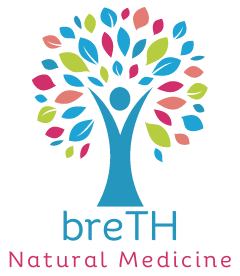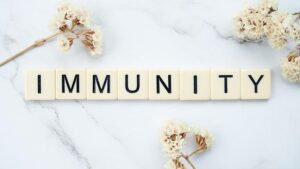3 Natural Ways to Optimize Your Immune System
The immune system is a complex system of the body and has bidirectional pathways with other systems of the body. As we head into “cold and flu” season, there are many preventative strategies that can be utilized to nurture a resilient immune response. Three key areas that are not often spoken about in regards to their connection with the immune system are the gut microbiome, methylation pathways, and mindset. Providing the proper support for these areas of health allows for a healthier immune system response.
Microbiome
Maintaining the health of the gut microbiome is paramount for immune homeostasis. Gut microbiota have the ability to regulate both innate and adaptive immune responses. When dysbiosis is present, intestinal permeability can ensue and promote immune dysregulation. Toxic byproducts from the gut can also translocate to the brain and cause neuroinflammation, and ultimately, develop into neurological disorders, such as Alzheimer’s Disease [1]. In one study, 212 individuals who experienced severe illness from COVID-19 demonstrated a lower abundance of beneficial gut bacteria[2].
In other studies, microbiome alterations were found after infection with SARS-CoV-2, as a result of proinflammatory cytokine elevation and the downregulation of ACE2. As it relates to the health of the gastrointestinal system, ACE2 plays a role in the synthesis of antimicrobial proteins [3]. It will be imperative to address the health of the gut microbiome in patients who have contracted COVID-19 and to help prevent individuals from developing severe symptoms.
Probiotics exert immunomodulatory effects through a variety of mechanisms. Probiotics upregulate interferon, T cell, and NK cell activity, inhibit viral replication, modulate cytokine responses, influence ACE2, and inhibit pathogen binding via production of mucin [4]. They can even increase the absorption of Vitamin D through enhancement of the VDR receptor [5]. Several studies have documented various probiotic strains that improved COVID-19 symptoms and reduced the severity of the disease. Specific strains such as Lactobacillus Plantarum, Lactobacillus Rhamnosus, and Bifidobacterium Longum were helpful not just against COVID-19, but also in improving neurological and psychiatric health [6].
Mindset
At one point or another, you may experience stress in different seasons of your life. Chronic stress can affect our immune system response in a variety of ways. Chronic stress can lead to immune dysregulation by promoting pro-inflammatory substances, known as cytokines, such IL-6, TNF-α, and IFN-γ and a decrease in anti-inflammatory substances [7]. In addition, chronic stress can suppress the immune system response. Stress can also contribute to dysbiosis, which is a state of microbial imbalance in the gut. This can mean an increase in harmful bacteria, decrease in beneficial bacteria, and/or an overgrowth of yeast. Dysbiosis can contribute to intestinal permeability, aka a “leaky gut”, and as mentioned above, this can contribute to improper signaling in the immune system.
Methylation
Epigenetic alterations have been reported as a risk factor in developing long-COVID. McCaddon and Regland (2021) postulated several mechanisms by which this occurs [8]. The significant amount of oxidative stress caused by SARS-CoV-2 virus can increase the demand for S-adenosylmethionine (SAM). A decline in SAM levels results in an elevation in homocysteine levels, which has been linked to a variety of mood and neurological disorders [9]. Their study proposes that elevated homocysteine levels also contributes to the brain fog that long COVID patients experience. The decline in SAM can also reduce the CBS enzyme activity, which is responsible for the production of glutathione. Testing homocysteine levels in these individuals would be beneficial; for a deeper understanding of the patient’s methylation status, a methylation panel may be ordered.
Supplementation with B vitamins in individuals with methylation concerns improves neuropsychiatric symptoms associated with long COVID. As it relates to immunity, B vitamins can prevent viral binding and replication, lessen pro-inflammatory cytokines, and modulate the responses between the innate and adaptive immune system; additionally, B vitamins can reduce neuroinflammation. A study by Ragan et al. (2020) demonstrated that riboflavin with UV light reduced SARS-CoV-2 titers in plasma and whole blood samples [10]. Niacin demonstrated lung protective properties due to reducing proinflammatory cytokines. Pyridoxal 5′-phosphate can prevent abnormal clot formation and maintain endothelial integrity, reducing the risk of strokes and myocardial infarctions associated with long COVID. Folic acid was studied in preventing SARS-CoV-2 from binding to cells by inhibiting the enzyme furin. Vitamin B12 is a critical nutrient for neurological health; it supports myelin synthesis and affects microbiota homeostasis.
Proactive Measures You Can Take:
- Optimize your gut health
- Take deep breaths before and after you eat to ensure your body is in a calm state to digest and absorb your nutrients properly.
- Take probiotics on a regular basis. Certain strains as listed above can support your immune system as well.
- Consider completing a comprehensive stool analysis for a deeper evaluation of your digestive system if you are experiencing gastrointestinal symptoms.
- Optimize your nervous system
- It may be beneficial to take an adaptogen for times when you are experiencing higher than normal stress levels. Also, if it is a recurrent stressor, identify the underlying thought patterns that make you feel stressed and retrain your mind to respond differently in the future. There are a variety of techniques that can help you rewire your brain.
- Schedule an acupuncture appointment at our office and release tension and stress from the week while enhancing your immune response. Call the office to schedule your session!
- Optimize your nutrition
- Limit added sugars in your diet as sugar can suppress your immune system.
- Make natural “flu shots” by making a mocktail of apple cider vinegar, cayenne pepper, ginger, and fresh garlic. See the recipe here.
- Stock up on my Cold & Flu Protocol to prevent illness and address any symptoms if you start feeling run down.
Be well,
Dr. Yas

